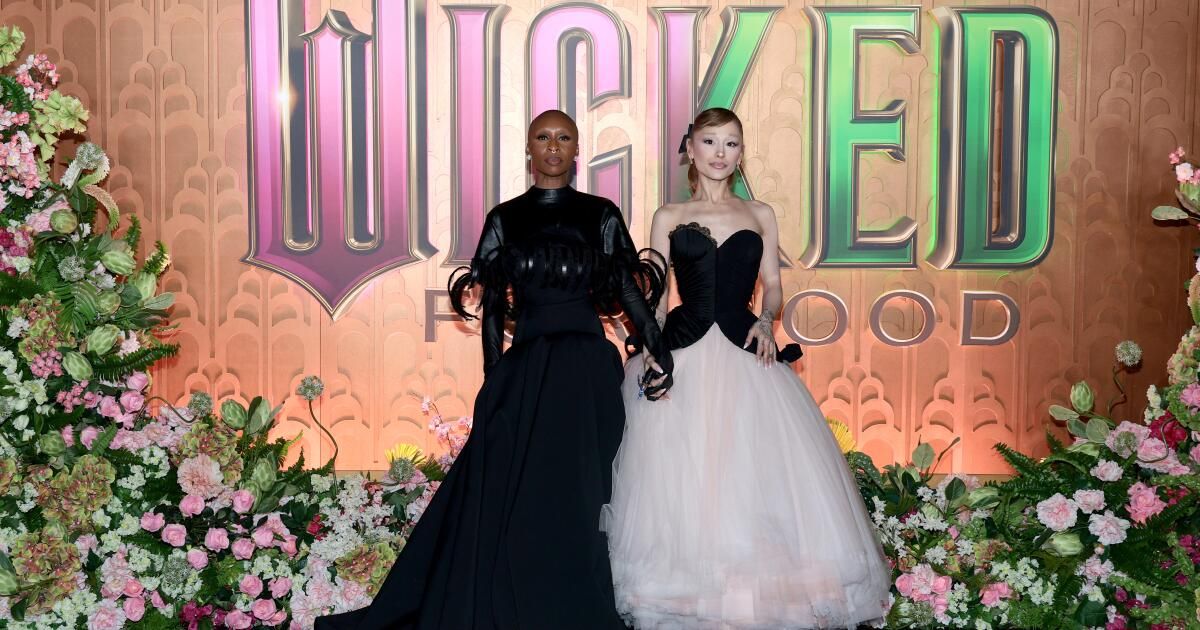Between the long-running rivalries between Los Angeles and New York City (Dodgers or Yankees, expressway or subway), the great divide between Hollywood and Broadway has fueled many tabloid feuds. A recent series of synergies between screen and stage may help flip that script, particularly when it comes to telling the stories of girls and women and the fight for gender equality.
It's certainly an eclectic mix. This week marks the opening of “Suffs” at the Hollywood Pantages Theatre, kicking off its inaugural national tour. Two-time Tony Award-winning musical about the women's suffrage movement takes the stage as the Trump administration questions publicly the good sense of the 19th Amendment, which included women in the right to vote.
ActorJennifer Lawrence recently announced a new film project featuring the return of the diva of all divas, Miss Piggy, a character Lawrence considers “a feminist icon”; The script will be written by Cole Escola, winner of the 2025 Tony, the first non-binary person to win the award for best actor in a play, an award obtained for his role in “Oh, Mary” (The funniest, cheesiest, gayest play Broadway has seen in years).
Earlier this year, the Broadway hit “John Proctor Is the Villain” – a witty reflection on what it means to be a young woman in Trump's America – introduced Sadie Sink, one of the breakout teen stars of the wildly popular Netflix series “Stranger Things,” which is about to begin its long-awaited finale.
And the conclusion to the saga of the best friends in all of Oz, the second part of the big screen adaptation of Broadway's “Wicked,” is breaking box office records.
And finally, joining this cultural moment on stage and screen on both coasts comes the Broadway blockbuster “Liberation,” a play about a women's consciousness-raising group in the 1970s. Its clear catalyst? Los Angeles' own Ms. magazine, the historic feminist publication started at that time by Gloria Steinem. Today, it continues to publish as a non-profit organization based in Beverly Hills.
“Liberation” alternates between the aspirations of a group of second-wave feminists and the current reality of one of their daughters. Playwright Bess Wohl's mother, Lisa Cronin Wohl, was a writer for the magazine in its early days. Ms. is also directly involved in the plot and character arc: when one of the members waves an article encouraging “naked consciousness,” the group strips and strips naked while the women discuss how they feel about their bodies. (Members of the audience) The phones remain locked in bags that block the signal). covered breathless in the media, not only for its raw vulnerability, but also for its next-level speech and artistic direction that are simultaneously revealing and heartbreaking.
Like all production. It has earned rave reviews across the board, a hardly predictable response to a two-hour-plus play that forgoes celebrity firepower and is about feminism, nothing more, praised as “necessary, messy and bitingly funny” and “cosmically immense.”
The truth is that the opportunity to witness a group of women who refuse to accept the status quo and fight to forge a more equal future is truly immense. It would be wise for all of us to better understand their thinking and strategies in the here and now.
Except for the painful part of watching this bold act of imagination set in the '70s: we already know the epilogue. These same women who won the right to abortion also lost it during their own lifetime. Donald Trump has been elected president twice, with the majority of the votes. white women votes every time I ran. Every day we face a new round of policy pushback, coming not only from the White House but also from state legislatures across the country.
As a culture of regressive talking heads proliferates on podcasts and social media: naughty wives and toxic masculinity and the manosphere, oh my! – many of the institutions we might have assumed would be a bulwark seem more ineffective than ever. (A recent viral headline that has since been originally changed raised the question“Women ruined the workplace?” And you, New York Times? Indeed.)
That's why it's vital that Broadway and Hollywood lead the way with thoughtful and provocative material to accompany this moment. It is not simply a “nice to have” or an outlet to escape, but a necessity for the future of democracy. The ideas we are exposed to in theater and on screen can be an indicator of our collective potential and a glimpse of how much further we can advance or how far we can fall backwards.
As for “Liberation,” while it does not attempt to answer what any of us can or should do to ignite our activism, it does direct us to a crucial turning point. As one of the characters asks, “Why do you ask what we did wrong? Instead of asking what's wrong with the world.” (Echoing the same, when asked on the red carpet about advice for LGBTQ+ youth, Escola advised: “You're right. Everyone else is wrong.”)
Continuing to bridge the gap between both coasts, Ms. recently paid tribute to “Liberation” at the Skirball Cultural Center, highlighting the show's service as a work of art. and a call to action. It's a call the industry would do well to follow. These are the stories that will shape what happens next.
Jennifer Weiss is executive director of the Birnbaum Women's Leadership Center at New York University School of Law.












